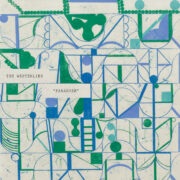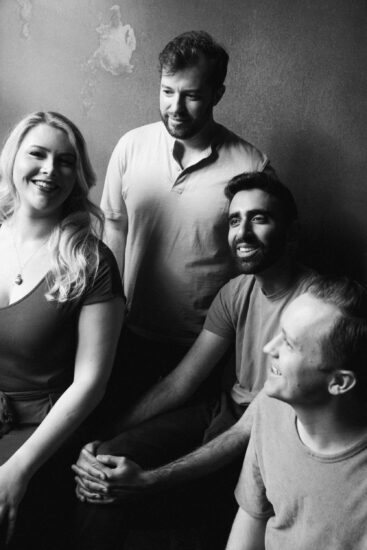Duke Ellington is generally recognized as the popularizer, if not the originator, of the term “Beyond Category,” to describe music that transcends one particular genre. As the composer of works for big band, orchestra, dance, theater and film, Duke put forward the term as aspirational, because he would always be remembered as a jazz artist.
For the brass quartet The Westerlies, “beyond category” rings true thanks to their unique blend of jazz, classical, new improvised music, chamber music and Americana. Trumpeter Riley Mulkerhar, who founded the group along with trombonist Andy Clausen, says that the band’s special niche within many music genres evolved organically. “We had to create our own sound from the get-go,” he explains. “But that ended up becoming our secret weapon because we began to find something that was very unique, very personal and our own.”

West to East
The roots of the Westerlies are embedded not only in the Seattle music scene, but even deeper in its local school system. “The original four members all grew up in Seattle together,” Mulkerhar says. “We were going through these great music programs in the public schools, through middle school and high school. Before The Westerlies existed, we were getting to know each other at all these music festivals, youth symphony programs. Then as we got older, we were sharing mentors and getting together outside of school. We started to form ensembles and get involved in the Seattle scene.”
One very important mentor there was (and still is) Wayne Horvitz, the creative keyboardist and composer with ties to John Zorn and Butch Morris from his New York days. “Wayne was a teacher to all of us individually,” Mulkerhar says. “He gave us our first gig at his club in Seattle, the Royal Room. Our first record was produced by him and featured his music. He really shepherded us through those early years, getting us on our feet.”
But what was this band? Four brass instruments with neither a chordal instrument (e.g., piano or guitar) nor a rhythm section? “Basically, we had no precedent and had no intention of forming a group in this instrumentation,” Mulkerhar says. “It was really just the personalities. The four of us wanted to make music together. Trumpets and trombones were the instruments we happened to play.”
Although there is a tradition of brass quintets in classical music, the original members of The Westerlies had little knowledge of it. Later, Mulherkar explains, “we became very intimately familiar with it and we found inspiration and mentorship in groups like the American Brass Quintet, St. Louis Brass, Canadian Brass and others. But we were not really coming out of that tradition as much as a tradition of jazz, improvised music and contemporary classical music.”

Hearing Voices
On every recording, the band’s mellifluous sound belies its metallic instrumentation. This may explain in part why the group has an affinity with vocalists, going back to its 2021 collaboration with Theo Bleckmann on This Land — ostensibly a protest album, thanks to songs like “Tear the Fascists Down,” “Look for the Union Label” and “The Jolly Banker.”
The Westerlies have a long history with singer-songwriter O’Donovan, with whom they’d performed on Chris Thile’s short-lived NPR variety show, Live From Here, and for whom they opened on one of her tours. “The song that Aoife sings on the record, ‘Weeping Mary,’ is the first song we ever played with her and is the song that we would often end every night with her during that tour,” Mulkerhar explains. “We had actually recorded a version of that song before as a quartet [on Wherein Lies the Good], but we really wanted to make a new version with her.”
Sam Amidon, the other vocalist featured on Paradise, had a more formative influence on the current project. “Sam is the one who introduced us to the art of shape-note singing,” Mulkerhar recalls. “We fell in love with these songs originally through his renditions and performances of this music. We then discovered the whole lineage that he was representing.”
That lineage has its roots originally in England in the 18th and 19th centuries. However, The Westerlies largely tapped into the American side of the tradition. “What I love about it is that it’s very much an amateur practice,” says Mulkerhar. “People come in and they sit in a square formation facing each other, and they sing these hymns at the top of their lungs. For anyone who doesn’t read music, you learn the shapes of the notes. There’s this sort of inclusive spirit that has always been present in shape-note singing that we fell in love with.”
Precision and Palpable Soul
That sense of community is a core value for the group, which since 2018 has organized a festival called, naturally, Westerlies Fest, in their home city. The event combines evening performances with daytime in-school workshops at local high schools and middle schools.
“It’s been a great opportunity to reconnect with our Seattle roots,” Mulkerhar says proudly. “We just drop in and give free workshops and master classes and work with their bands. We do that during the week and then over the weekend we play concerts. It’s a great opportunity to create one experience that is representative of all the different things we do, whether it’s composing, commissioning, performing or teaching.” Over the years, the festival has presented more than 30 artists, among them Theo Bleckmann, Samora Pinderhughes and Robin Holcomb.
John Gilbreath, longtime executive director of the Seattle-based Earshot Jazz, has witnessed the group’s evolution from their earliest days in the area and waxes profusely about how far they’ve come. “Everything is unique,” he says. “The original quartet was good, but the musicianship in this current configuration is astounding. And all of the control and precision balanced with palpable soul. Even the through-composed pieces flow with remarkable ease. It’s kind of jaw-dropping. And as can be the case with younger people, they just keep getting better each time you hear them. Plus, they’re comfortable with the spirit side, even seeking out sources that affirm the calm good in the world. And they align themselves with kindred spirits in the music world, wisely.”
For his part, Mulkerhar says that Paradise well represents all of their past experiences, in Seattle and New York and everywhere in between. “Coming up on our 15th season next year, I feel like it’s a culmination of a lot of things — finding our sound, finding our collaborators and tapping into these traditions of American music and giving them the time and the space to marinate so that we can find our own voice through them.” JT
